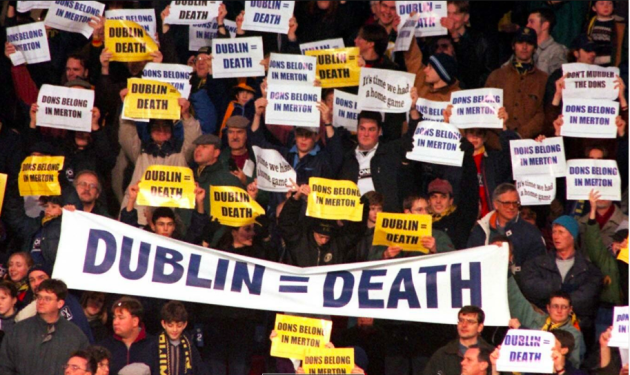1. “There’s a kind of poetry in the struggle, is what I’m saying.”
“Here we go . . .”
“There is, though. It does us good to realise it every once in a while. Sport gives us that. The ups, the downs. The knots in the stomach. The flickering hope that something magical could happen. The idle rage at another year pissed away. Our lads weren’t good enough to go very far, I know that. But when I was roaring at the telly and not able to sit down for those last frees, I felt something very real. Something that had been missing for months and months, for so long that I could hardly remember it until it came back and got me. It felt terrible. But it felt good to feel it. So yes, they’re out. Does that answer your question?”
The Irish Times’ Malachy Clerkin on why the pain of Monaghan’s championship exit felt as keenly as ever during a pandemic
2. A couple of months back, I was of the opinion that if no supporters were present, the games should not go ahead. That was dead wrong; Cavan fans watched the game on television in their thousands and the lift it has given the county is indescribable.
And while I’m not complaining about being there, it must have been nice to watch it in the comfort of a living room all the same.
Around 2.15pm, hands were quivering and teeth rattling – and that was just in the press box. It was, I deduced, a combination of the biting cold and the nervous tension.
Maybe that sounds unprofessional, for a sports journalist to be so invested in the fortunes of a football team they are expected to cover with the detachment of a neutral. I get that but you must remember this: the fact that there is a responsibility to report evenly and critically on the team you grew up supporting creates a strange situation for regional journos across the land.
Putting to print a negative comment can feel like a betrayal; not doing so, though, would be a dereliction of duty.
Paul Fitzpatrick writes for the Anglo Celt about the experience of covering Cavan’s shock win in Ulster
3. Manchester United’s 3-0 win over Wimbledon on August 17, 1996, will forever be remembered as the game that ended with a 21-year-old David Beckham scoring from the half-way line, propelling the midfielder to superstardom.
But it was almost the game that changed the course of football history in an entirely different way.
Sat in the directors’ box that day at Selhurst Park, alongside Johan Cruyff, watching his son Jordi make his league debut for United, were an Irish consortium. The previous evening, they had been to dinner with Wimbledon’s owner Sam Hammam and believed they had reached a deal that would transform football in Britain and Ireland forever.
The Athletic’s Jack Pitt-Brooke on the time Premier League side Wimbledon very nearly moved to Dublin
4. A man is naked and his oversized genitalia is flopping about in the rain.
He inserts his fingers into the gaps of the steel fence and begins to lift himself, revealing his white bottom to the couple of hundred fans in the away end.
When he turns around like a conquering hero, I realise he looks a bit like Pat Sharp, with his blond highlights and an impossible facial tan that defies the time of year.
A couple of paunchy stewards see what is happening and they scramble enthusiastically into action, as stewards universally tend to whenever a streaker enters a football pitch.
That is when a world of flesh and mud collide. He’s made it onto the edge of the 18-yard box but for some reason, he checks back and runs behind the goal.
The Athletic’s Simon Hughes on his long history with non-league side Marine
5. Life has rarely come easy for Chamberlain. He was born in Brixton to a teenage mother and a violent, soon to be estranged father. “I was an accident child!” He laughs. “I was an accident child, and everyone else was with my stepdad. Some of the things we went through, I don’t blame my mum cos she was still a kid herself. A lot of things I went through during my childhood I’m grateful for because it turned me into the person I am today.”
The estates that raised Chamberlain were a far cry from the coffee shops and wine bars of modern Brixton. “You see the top drug dealers. You see them with their chains. You see them getting everything: chains, cars, girls, whatever. And you’re like, ‘Rah! I wanna be like him!’
“When you’re young, you don’t really have no father figure. And cos you don’t have no father figure, you counted the olders as a father figure. So they’re like, ‘don’t worry, I got you, I got you, bro.’ They’d drop you a little twenty, fifty pound note – and at that time, that’s like the fucking world! Do you know how much fucking sweets you could buy with that shit? Oh my goodness!”
Isaac Chamberlain rose from drug deals in Brixton to headlining the O2 Arena at 23 years old. Then everything went wrong. Max Williams writes about how he fought his way back from hell
The42 is on Instagram! Tap the button below on your phone to follow us!

